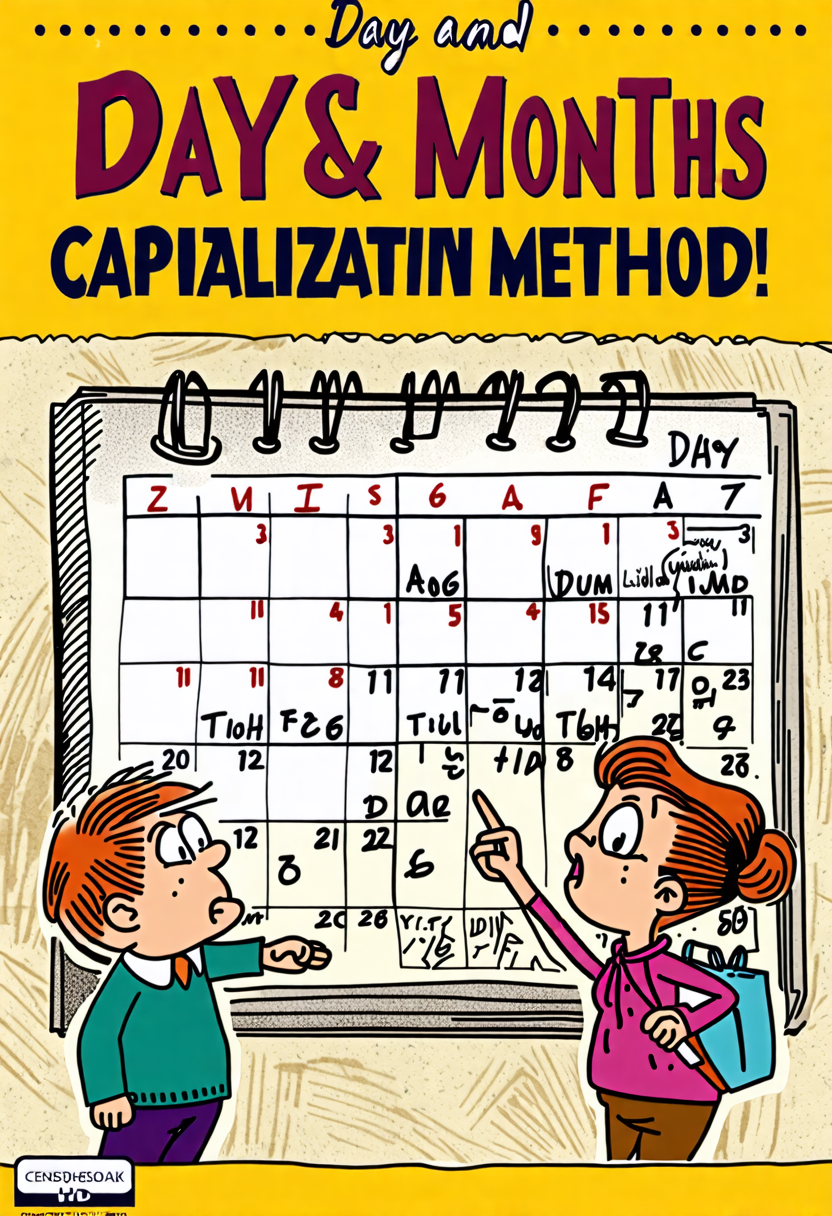Days and Months Capitalization Method
Capitalizing the days of the week and months of the year is necessary for clear and proper English writing. The days—Monday through Sunday—and months—January through December—are always capitalized since they are proper nouns. This practice guarantees consistency and upholds grammatical standards. Incorrect capitalization can lead to confusion and diminish the professionalism of your writing.
Proper Nouns Capitalization
Why is it essential to capitalize proper nouns?
Proper nouns refer to specific names of people, places, organizations, and sometimes things. Capitalizing them distinguishes these unique entities from common nouns.
For example, ‘John’ refers to a specific person, while ‘man’ is a general term. This distinction aids in clear communication and guarantees proper nouns stand out in written text.
Proper nouns also include days of the week, months, and holidays. By capitalizing ‘Monday,’ ‘March,’ and ‘Christmas,‘ we recognize them as specific time-related entities.
Days of the Week
Days of the week are always capitalized because they are considered essential nouns. This rule applies to all seven days: Monday, Tuesday, Wednesday, Thursday, Friday, Saturday, and Sunday. Proper capitalization guarantees clarity in writing and shows respect for the conventions of the English language. Below is a table illustrating the correct capitalization for days of the week.
| Incorrect | Correct |
|---|---|
| monday | Monday |
| tuesday | Tuesday |
| wednesday | Wednesday |
| thursday | Thursday |
| friday | Friday |
Months of the Year
Capitalizing the names of the months is crucial for proper grammar and clarity in writing. Each month, from January to December, is a proper noun. This means they should always be capitalized.
Using lowercase letters for months can lead to confusion and errors in communication. For instance, writing ‘may’ instead of ‘May’ could be mistaken as a verb rather than the month.

Consistency in capitalization guarantees that your writing is professional and easy to read. Whether you are writing an email, a report, or a casual note, always capitalize the names of the months.
Capitalizing Holidays
Proper capitalization of holidays is essential for maintaining grammatical accuracy and clarity in writing. Holidays are proper nouns and should always be capitalized. This includes well-known holidays like Thanksgiving, Christmas, and New Year’s.
Additionally, other holidays such as Halloween and Easter also require capitalization.
Using lowercase for holidays can help guarantee clarity and prevent errors. For example, writing ‘thanksgiving’ or ‘christmas’ is incorrect. Capitalizing holidays ensures that they stand out as significant events in the text.
This rule applies universally across all forms of writing, from formal documents to casual correspondence.
Not Capitalizing Seasons
Seasons are typically not capitalized unless they are personified or part of a proper noun. This means that the names of the seasons—spring, summer, autumn (or fall), and winter—are written in lowercase in standard writing.
For example, you would write, “Many flowers bloom in spring,” or “We enjoy skiing in winter.” The rationale is that seasons are considered general nouns, not specific names.
However, if a season is part of a title or a specific event, it may be capitalized. For instance, “Summer Olympics” or “Winter Festival” would require capitalization. Remember, the key is to treat seasons as common nouns unless they are used in a context that elevates their status to proper nouns.
Personifying Seasons
While seasons are typically written in lowercase, they can be capitalized when personified in creative writing. This means giving human traits or actions to a season.
For example, ‘Winter’s icy breath chilled the night’ or ‘Spring danced across the meadows.’ In such cases, the season is treated as a proper noun. This stylistic choice adds a vivid, poetic element to the writing.
Personifying seasons can make descriptions more engaging and dynamic. However, it is important to note that this capitalization is specific to creative contexts. In regular usage, like ‘I enjoy the colors of autumn,‘ seasons remain lowercase.
Day and Month Exceptions
Occasionally, there are specific contexts where the standard capitalization rules for days and months do not apply. For instance, in poetic or artistic expressions, lowercase letters may be used to create a softer tone or particular aesthetic. Additionally, some modern digital communications, such as text messages or informal emails, might forgo capitalization for brevity or stylistic purposes. However, these exceptions are typically informal and should not be used in professional writing.
Here’s a comparison to highlight the emotional difference:
| Traditional Capitalization | Lowercase for Style |
|---|---|
| Monday | monday |
| December | december |
| “Happy Friday!” | “happy friday!” |
Examples of Capitalization
Examples of capitalization can illustrate how proper nouns like days, months, and holidays should be written. For instance, ‘Tuesday’ and ‘Friday’ are always capitalized, as seen in the sentence, ‘The gardener comes on Tuesdays and Fridays.’
Similarly, months such as ‘March’ in ‘Your birthday is in March’ are capitalized. Major holidays like ‘Thanksgiving,’ ‘Christmas,’ and ‘New Year’s’ are also capitalized, as in ‘Thanksgiving is in November’ and ‘Christmas is in December.’ Even holidays like ‘Halloween’ and ‘Easter’ follow this rule.
It is important to remember that while seasons like ‘winter’ and ‘autumn’ are not capitalized, they can be when personified in creative writing, as in ‘Winter blankets all creatures with somniferous snow.’
Common Mistakes
Despite understanding the basic rules of capitalization, people often make common mistakes. These errors can enhance the quality of written communication. Here are some frequent pitfalls:
- Incorrect Capitalization: Failing to capitalize days of the week or months of the year, e.g., ‘monday’ instead of ‘Monday.
- Over-Capitalization: Incorrectly capitalizing seasons like ‘Summer’ or ‘Autumn’ when they are not personified.
- Inconsistent Usage: Mixing capitalized and non-capitalized forms within the same text, leading to confusion.
- Ignoring Context: Not capitalizing holidays or special days, e.g., writing ‘christmas’ instead of ‘Christmas.’
Quick Reference Guide
Here is a quick reference guide to help you remember the capitalization rules for days of the week, months, and holidays. Always capitalize days, months, and holidays as they are proper nouns. Seasons, however, should not be capitalized unless they are personified or part of a proper noun. Below is a table for quick reference:
| Category | Example |
|---|---|
| Days of the Week | Monday, Friday |
| Months of the Year | January, March |
| Major Holidays | Christmas, Easter |







